

Patricia Rogerio
Interdependence Hypothesis. What is the Interdependence Hypothesis?
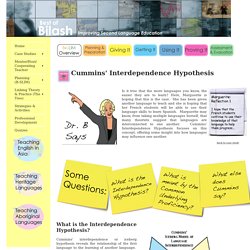
Cummins' interdependence or iceberg hypothesis reveals the relationship of the first language to the learning of another language. What appears to be two very different phenomena on or above the surface is actually interdependent psychologically. What is the Common Underlying Proficiency? The Common Underlying Proficiency (CUP) model or the "one balloon theory" described by Jim Cummins purports that proficiencies involving more cognitively demanding tasks (such as literacy, content learning, abstract thinking and problem-solving) are common across languages.
The CUP model is represented with the "dual iceberg metaphor" and is the basis of the hypothesis called the linguistic interdependence hypothesis. Jim Cummins. Patricia Kuhl: The linguistic genius of babies. Stephen Krashen's 5 Hypotheses of Second Language Acquisition. Stephen Krashen on Language Acquisition.
Stephen Krashen's Theory of Second Language Acquisition (Assimilação Natural - o Construtivismo no Ensino de Línguas) LANGUAGE LEARNING x LANGUAGE ACQUISITION. ENGLISH MADE IN BRAZIL - MENU PRINCIPAL. I'm a teacher of English in Spain and of all the web sites I have visited, yours has been the most helpful.
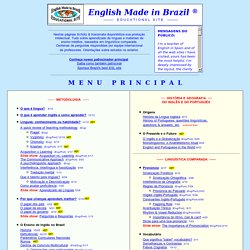
I'm deeply impressed by the layout, the clarity of cross-references and the honest and informed approach to English learning and teaching that you provide. It is an example and a stimulus for all people interested in English. Thank you so much.MARGARITA FERNÁNDEZ DE SEVILLA MARTÍN-ALBO, 1/04 O relatório "Educação para o Século XXI" da UNESCO deveria apresentar reflexões, também, para o ensino da Língua Inglesa. E mais, antes de redigir qualquer texto a este respeito, estudar profundamente o conteúdo indispensável deste site maravilhoso de vocês. Crianças bilíngues: como ensinar inglês antes da alfabetização? - Eduqa.me. Bilingual Kidspot - Raising Bilingual or Multilingual Kids. Sproutly – Educação Bilíngue para Todos.
Aprender ao contrário é mais eficiente. A principal vantagem do Flipped Classroom, de acordo com Bergmann, é que termina sendo mais eficaz porque o professor se adapta aos diferentes ritmos de aprendizagem e nenhum estudante é deixado para trás.
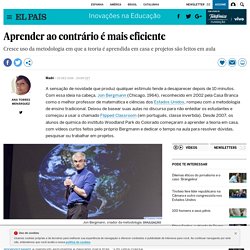
"Em uma classe tradicional, o professor mostra alguma informação que será muito fácil de processar para alguns e não para outros. Em seguida, eles vão para casa para fazer os deveres e aqueles que têm pais com conhecimento do assunto, sempre acabam ganhando. Este método permite que na sala de aula cada aluno receba o que precisa", explica Bergmann ao EL PAÍS. A revolução deste método pedagógico é não assumir que todos os alunos vão avançar na mesma velocidade. "É uma aposta na personalização e uma cruzada contra a padronização", diz Bergmann. Este método não é novo. Mas é como Flipped Classroom a nomenclatura que aparece hoje nas listas de inovação educativa e novas metodologias. "Os estudantes são autônomos, são os responsáveis por seu aprendizado sempre com a ajuda do professor. Importance of play for babies & children. Play is more than just fun for babies and children.
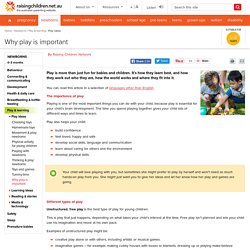
Home - Teaching Strategies, LLC. Effective Teacher-Child Interactions. Carol Dweck: The power of believing that you can improve. How can parents and teachers best educate young children?
What principles can both teachers and parents bring to the education of very young children? Gillian Craig, who was part of the Learning Time with Shaun and Timmy writing team, explains. As teachers and parents, we follow certain principles in our roles. ZERO TO THREE. How young children learn English through play. Deb Roy: The birth of a word. Listen to Your Mother. Young children face a remarkable challenge in learning to use the language of their culture. Toddlers vary widely, however, in the rate at which they learn new words.1 A team of Harvard Graduate School of Education researchers set out to ask whether and how children's language environment can impact vocabulary development.
In their study of mother-child pairs from low-income families, they found that mothers who used many different words (not just many words) had toddlers with faster growth in vocabulary use. During the toddler and preschool years, most children learn to use hundreds of words, combining them into sentences and engaging in conversation with others. From previous research, we know that variation in vocabulary growth relates to child characteristics like gender, and also to parental factors. What did they find? 1Huttenlocher, J., Haight, W., Bryk, A., Seltzer, M., & Lyons, T. (1991). 2Bauer, D.J., Goldfield, B.A., & Reznick, J.S. (2002). Let's Talk. What do babies need in order to learn and thrive? One thing they need is conversation — responsive, back-and-forth communication with their parents and caregivers.
This interactive engagement is like food for their developing brains, nurturing language acquisition, early literacy, school readiness, and social and emotional well-being. A dispiriting number of children don’t get that kind of brain-fueling communication, research suggests. In early childhood policy (and in the wider media), much attention has been paid to the so-called word gap — findings that show that low-income children hear 30 million fewer words, on average, and have less than half the vocabulary of upper-income peers by age three. But putting that alarming number in the spotlight obscures a more critical component of the research, says Harvard Graduate School of Education literacy expert Meredith Rowe: it’s not so much the quantity of words but the quality of the talk that matters most to a child’s development.
Why does my toddler love repetition? Paediatric speech and language therapist.
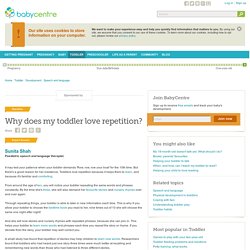
It may test your patience when your toddler demands 'Row, row, row your boat' for the 10th time. How can I help my child to start talking? (Video) Health visitor Sara Patience describes how you can help develop your child's language skills by talking and playing with her.
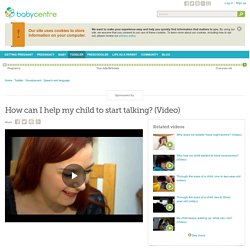
Show transcript Hide transcript. What Parents Can Gain From Learning the Science of Talking to Kids. The widening education gap between the rich and the poor is not news to those who work in education, many of whom have been struggling to close the gap beginning the day poor children enter kindergarten or preschool.
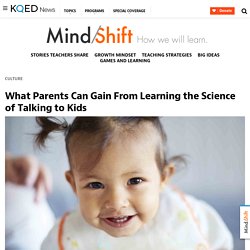
But one unlikely soldier has joined the fight: a pediatric surgeon who wants to get started way before kindergarten. She wants to start closing the gap the day babies are born. When Dr. Dana Suskind began doing cochlear implants on infants at the University of Chicago—a cutting-edge surgical technique that allows once-deaf babies to hear—in her follow-ups with families she noticed a stark difference in how the now-hearing children acquired language. Once they could hear, some children’s language skills thrived and grew, while others languished. The difference turned out to be the words children heard from their parents and caregivers, millions of them. For Suskind, a lightbulb went on. Bringing Parents On Board. How young children learn English as another language. By Opal Dunn, educational consultant and author Introduction Young children are natural language acquirers; they are self-motivated to pick up language without conscious learning, unlike adolescents and adults.
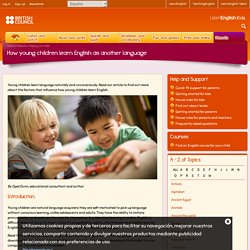
They have the ability to imitate pronunciation and work out the rules for themselves. Any idea that learning to talk in English is difficult does not occur to them unless it’s suggested by adults, who themselves probably learned English academically at a later age through grammar-based text books. Read the notes below about young children learning English as another language. The advantages of beginning early.